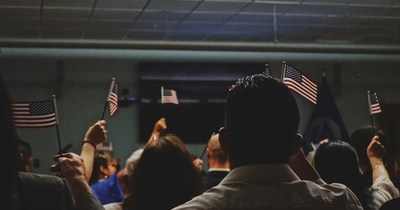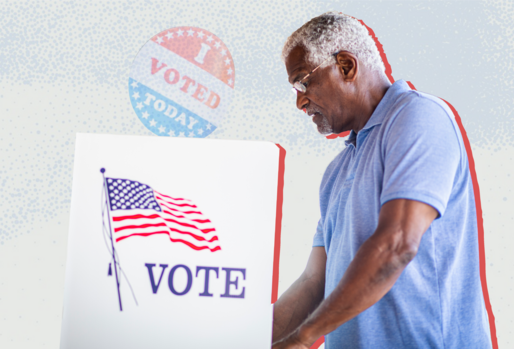
Immigrants and Constitutional Rights: What the Recent Attacks on Immigrants Mean for Our Democracy
The administration’s detention and removal of immigrants without free speech, due process, and judicial authority is a crisis for immigrants and a sign that our democracy is in peril.

The first 100 days of the Trump Administration have tested our nation’s constitutional democracy and the rights of us all. From its recent power grabs and attacks on First Amendment and due process rights to its undermining of federal law and judicial authority, the administration has targeted a wide swath of institutions and individuals. These include some of the nation’s wealthiest universities and most powerful law firms, as well as thousands of civil servants seeking to preserve a basic living and carry out critical functions of our federal government. But it is noncitizens and their children who have been targets of the most acute effects of executive overreach and suffered the most in terms of their constitutional rights.
It is noncitizens and their children who have been targets of the most acute effects of executive overreach and suffered the most in terms of their constitutional rights.
The administration has indiscriminately detained and removed noncitizens and shown little regard for their free speech rights, due process of law, or judicial precedent. In doing so, the administration has relied on highly questionable sources of executive power; attempted to upend decades of well-settled constitutional law; argued that federal courts lack jurisdiction over the President; and in some cases, sidestepped the courts altogether. The federal government has attempted to justify many of its actions by pointing to the President’s broad powers to regulate immigration and to protect national security. The President has even invoked the Alien Enemies Act of 1798, which grants, during time of declared war or invasion, the presidential power to apprehend and remove individuals who are citizens of a hostile country. The problem, of course, is that the U.S. is not at war with any country, nor is it being invaded by a hostile foreign power.
The powers of Congress and the President to regulate immigration to the U.S. are especially strong, drawing on what is known in immigration law as the “plenary power” doctrine. Rooted in the U.S. Supreme Court’s upholding of racist laws designed to curtail immigration from Asian countries in the late 1800s, the plenary power doctrine grants extensive powers to restrict entry into the U.S., even when those restrictions are based on race, ethnicity, or political views.
But for over a century, the Supreme Court has affirmed that once noncitizens are in the U.S., they have constitutional rights—whether they are lawful permanent residents, refugees and asylum-seekers, temporary visa holders, persons residing with permission of the government, or undocumented. As the Supreme Court has made clear: “Once an alien enters the country, the legal circumstance changes, for the Due Process Clause applies to all ‘persons’ within the United States, including aliens, whether their presence here is lawful, unlawful, temporary, or permanent.”1
The Constitution confers rights upon “persons” or “the people”—rather than upon just citizens—throughout its text.
The Constitution confers rights upon “persons” or “the people”—rather than upon just citizens—throughout its text. For example, the Fifth Amendment and the Fourteenth Amendment together prohibit all levels of government from depriving persons of life, liberty, or property without due process of law, or from denying any person the equal protection of the laws. The array of criminal justice protections in the Fifth Amendment, such as the privilege against self-incrimination, apply explicitly to persons, not just to citizens. And the First Amendment states that government shall make no law—not just affecting citizens but affecting everyone—that abridges the freedom of speech or the right of the people peaceably to assemble.
These constitutional rights are core to the daily operation of our democracy and to our systems of justice. Noncitizens who are criminal defendants enjoy the same guarantees of the Sixth Amendment, including the rights to a speedy trial, an impartial jury, and representation by counsel. Noncitizens who are in removal proceedings have an array of due process rights, including procedural safeguards, such as a full and fair hearing and the opportunity to present evidence on their own behalf. Like citizens, noncitizens living in the U.S. enjoy Fourth Amendment rights preventing arbitrary searches and seizures. Immigration and Customs Enforcement (ICE), for example, cannot enter an immigrant’s home without a valid search warrant signed by a judge. Nor can ICE engage in stops and detentions in most areas of the country, away from border zones, without a warrant or probable cause of an immigration violation. The Fifth Amendment similarly protects the right against self-incrimination, ensuring that immigrants detained by ICE have the right to remain silent.
And while our Constitution does not mandate absolute equality between citizens and noncitizens, the Supreme Court has long recognized that unequal treatment of noncitizens should trigger close legal scrutiny and has struck down most state and local government classifications based on “alienage.” It has also specifically affirmed that even undocumented children enjoy equal protection of the laws.2 Yet even these decades-old precedents are at risk as the administration disregards constitutional protections and emboldens state and local governments to follow suit.
For example, student activists—many of whom are people of color and religious minorities—have been seized for exercising their fundamental right to freedom of expression. Graduate students such as Mahmoud Khalil, a lawful permanent resident, and Rumeysa Ozturk, a student-visa holder, have resided lawfully in the United States for years but have been arrested and shuttled to immigration prisons thousands of miles away, based largely on their political views and speech regarding the war in Gaza. The administration’s assertions that their removal from the U.S. can be based on the Secretary of State’s mere belief that their presence would have “potentially serious adverse foreign policy consequences” only chills immigrants’ free expression and masks what is clearly viewpoint discrimination outlawed by the First Amendment.
Denials of due process have become a hallmark of the Trump Administration’s recent deportation actions. The administration has summarily removed and sent over two hundred migrants alleged to be Venezuelan gang members to a maximum security prison in El Salvador, with virtually no opportunity to dispute the allegations or present evidence in their cases. Many of these individuals were still in proceedings in immigration courts to determine their eligibility for political asylum before they were jetted out of the country.
And the administration has even gone so far as to explore the possibility of removing American citizens—naturalized and U.S.-born alike—to Salvadoran prisons if they have been convicted of serious crimes.
The administration has compounded its denial of basic due process by flouting judicial orders that would have halted the removals to El Salvador and returned the migrants to the U.S. to give them an opportunity to contest the government’s charges. The administration has also ignored the Supreme Court’s order to facilitate the return of Kilmar Abrego Garcia, who, by the administration’s own admission, was wrongly deported. And the administration has even gone so far as to explore the possibility of removing American citizens—naturalized and U.S.-born alike—to Salvadoran prisons if they have been convicted of serious crimes.
By executive order, the President is also attempting to deny birthright citizenship to children born in the U.S. if their parents lack citizenship or other specified immigration statuses. This not only flies in the face of the Fourteenth Amendment and Supreme Court precedent but also threatens to create a new underclass of vulnerable and exploitable immigrants. Millions of children born into undocumented status over the coming decades would be stripped of the basic rights of citizenship, including, ultimately, the right to vote.
And with ongoing promises of mass apprehensions and deportations, we can expect even more deprivations of rights if government agents and officials continue to play fast and loose with the Constitution, including Fourth Amendment infringements on reasonable searches and seizures, as well as violations of due process and equal protection of the law.
If they succeed in stripping the rights of one group, authoritarians will incrementally expand their targets until an entire nation is under their thumb.
Martin Niemöller’s famous quotation beginning “First they came for . . .” has been overused almost to the point of cliche. But it remains a stark reminder that authoritarian governments start by targeting the most marginalized and powerless groups first. When they do so, they test our collective resistance. If they succeed in stripping the rights of one group, authoritarians will incrementally expand their targets until an entire nation is under their thumb.
The Trump Administration’s flagrant violations of basic rights and disregard for the rule of law are not an issue of concern only for immigrants. Rather, they are a bellwether of a democracy in peril.


